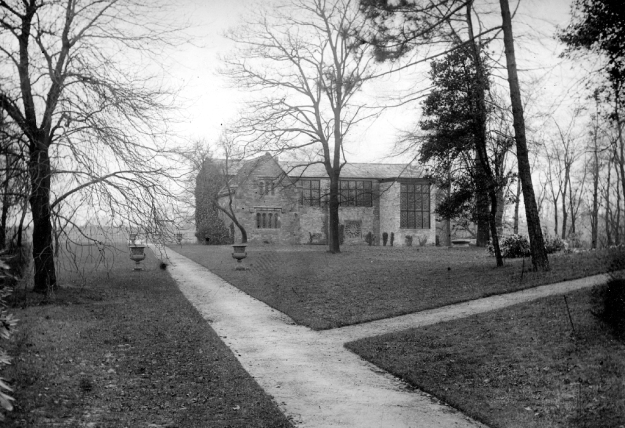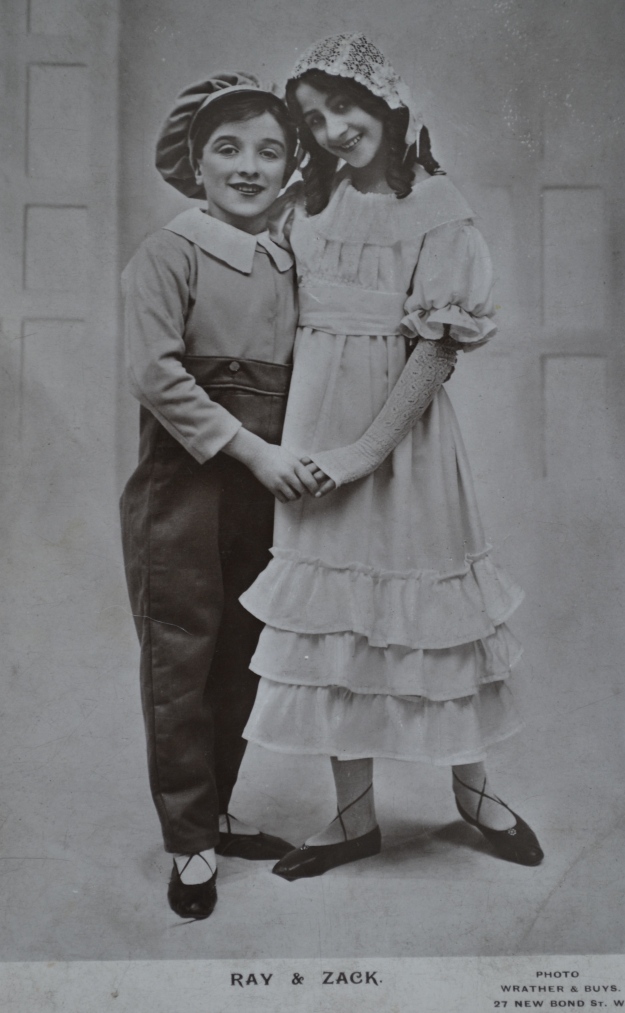
Drawing of Leo King by Ernie Lester, from Leo’s autograph book. Image (c) Emma King.
Last time I talked about my grandad, Leo King, and his music hall career, which lasted from roughly 1913 until he joined the RAF in June 1918. I’ve been trying to piece together a bit more information about Leo’s early life. One thing that puzzled me was how Leo had become involved in music hall in the first place. He was from a military family who were not well off; there was no evidence of anyone else in the family being involved in music or performance so how would Leo have come to tread the boards?
The earliest evidence I can find of Leo’s life is from the 1901 census. He was living at 10 Spencer Street, South Manchester, with his parents Thomas and Katharine and six siblings, four who were older than him and five-month-old twins Alice and John. Thomas worked as a door porter and judging by the occupations of people living nearby (bricklayer, charwoman, laundry work) the area was working class and probably fairly poor. The most interesting thing is his parents’ places of birth: Thomas was born in Ireland, Katharine in India. I’ll summarise what little I’ve discovered about them in a separate post.
The census has Leo aged one in 1901, though given that he had five-month-old siblings he must have been nearing his second birthday on 31 March when the census was taken. His RAF record gives his date of birth as the 23 May 1898, the right time of year but making him one year older than the census suggests. One of the many puzzles about Leo is that I can’t find a record of his birth. I can’t find a matching entry in the birth indexes available through the genealogy sites and a request to the General Record Office also drew a blank. I’ve searched for the eight siblings I know of (six here, his older brother Fred and another sister Nellie born after 1901) and can’t find a birth record for any of them either. This seems odd, given that civil registration of births, marriages and deaths had been a legal obligation since the 1830s, and I have yet to fathom why it is. I’d love to hear from anyone who might be able to explain how they evaded registration!
Leo’s mother Katharine appears on the 1911 census at a different Manchester address, this time in Chorlton. By this time Katharine was widowed and living with three of her grown-up children (Elizabeth, aged 22, Katherine, 21 and Thomas aged 18) and a nine-year-old daughter Nellie. There is also a visitor in the house, 20-year-old Nellie Wheatcroft. However there is no sign of Leo. Given that he could have been no older than about 13, I was surprised not to find him in the family home. Another brother William, two years older than Leo, is also absent, as are the twins Alice and John who would have been about nine years old. I searched addresses nearby in the hope that they might have simply been at a neighbour’s house (I’ve found other elusive ancestors this way) but drew a blank. The eldest of Thomas and Katherine’s children, Fred, lived with grandparents in both 1891 and 1901 but there was no sign of Leo and his young siblings in that household by 1911. I was puzzled.
The 1901 census listed Leo’s place of birth as Aldershot in Hampshire, the same as his four older siblings. The younger children were born in Manchester, so the family must have moved from Aldershot shortly after Leo’s birth. I began to make progress when I searched the 1911 census for Leo’s place of birth as Manchester rather than Hampshire and widened the age range I was looking for. Finally I found him: not with friends or relatives, as I had imagined, but at Buckley Hall orphanage in Rochdale, together with his brothers William and John.

Buckley Hall, photographed in 1900 by J. Watts. Manchester Libraries, Information and Archives, GB127.m67146.
According to Wikipedia, Buckley Hall was run by the Congregation of the Brothers of Charity to educate Roman Catholic boys who were referred there from the Chorlton Workhouse and were taught trades including bookbinding, plumbing and joinery. I knew Leo was Catholic as my grandma was a Methodist and she told me that her family didn’t approve of her marrying a Catholic. The religious creed register from the Chorlton workhouse is available via Find My Past and lists the dates of Leo, William and John’s entry into the workhouse early on 28 January 1909 and their departure to Buckley Hall shortly afterwards.

Leo and John King listed in the Charlton Union religious creed register, 1909. (c) FindMyPast.co.uk
I was stunned to find that Leo had spent part of his childhood in an orphanage. For a start, his mother Katherine was very much alive – she was the one who informed the workhouse authorities of the boys’ religion when they arrived there in 1909. Katherine stayed in contact with her sons, or with Leo at least – I’ve written elsewhere about her response to Leo’s enlistment with the RAF in 1918. I can only imagine that, in early 1909, the widowed Katharine could no longer look after her younger children after her husband’s death, and what a difficult time that must have been for her. My next step will be to try to find Thomas’s death certificate and also find John’s twin sister Alice of whom I can find no trace in 1911. I think Alice must have died by then as the census helpfully tells me that Katharine had eight children living and two dead. I know of nine of them, and Alice is the only one I can’t account for in 1911.
So how does all this connect with Leo’s career in music hall? The answer came when I found a blog post, ‘training the pauper child‘ on the Manchester University website. From it I learned that Buckley Hall didn’t just train boys in a trade, it also trained them in singing and music under the guidance of musical instructor Arthur Vandeput. Buckley Hall had a choir and, after a gift of brass instruments in 1892, the ‘famous Orphan’s Band’. The connection with Leo’s music hall act ‘Trombone, Troubles and Trials’ is clear and it’s brilliant to have found at least one of the missing links in my grandfather’s story.






